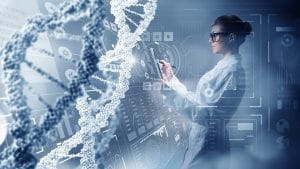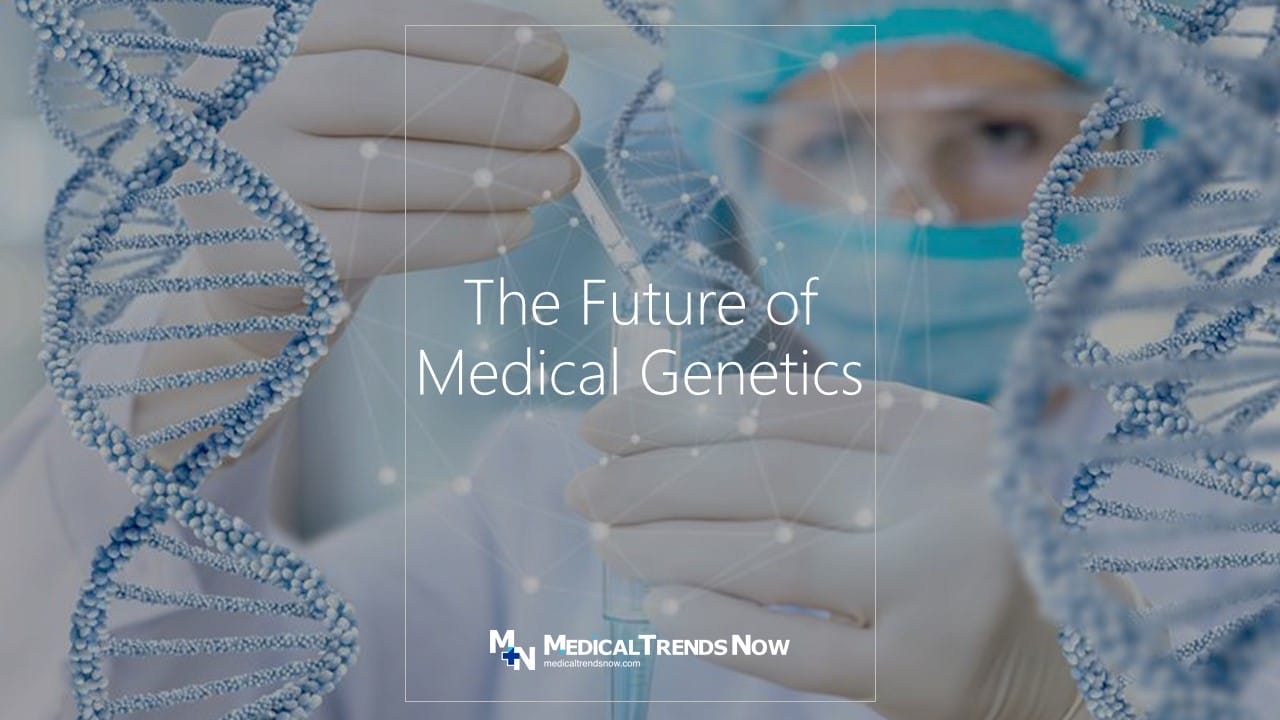Table of Contents
The future of Medical Genetics is promising and exciting! From compensation to the use of technologies, the future of medical genetics worldwide is looking bright!
Medical genetics is a relatively new field that deals with diagnosing, treating, and preventing genetic diseases. It is a rapidly growing field, and there are many opportunities for those with the right skills.
What is Medical Genetics?
Medical genetics is the study of how genes influence health and disease. It includes the identification and analysis of genetic markers, the development of new treatments and therapies using genetic information, and the study of how genes interact with each other to cause disease.
Medical Genetics is an essential tool in understanding human health and developing new ways to prevent, treat, and manage diseases.
How Does Medical Genetics Work?
Medical genetics is the study of how genes influence the health and well-being of people. Genetics is the study of the patterns and causes of diseases in people. Geneticists use genetic information to diagnose and treat diseases.
Medical genetics can help doctors diagnose and treat diseases and help researchers find new ways to prevent or treat diseases. Genetic testing can identify or determine if a person has a particular disease. This information can be found in a person’s DNA.
History of Medical Genetics
Medical genetics has been a relatively new field developing for the past several decades. It began with the study of inherited diseases and their causes and has since expanded to encompass a wide range of medical conditions. The history of medical genetics reflects the development of this field, as it has evolved from a small corner of research to an essential part of modern medicine.
The field of medical genetics has been around for over 50 years and has made significant progress in understanding the role that genes play in human health. Medical genetics research is constantly evolving as scientists learn more about the genetic basis of diseases.
The Innovations in Medical Genetics
Medical genetics is an ever-evolving field, as new technologies and discoveries are made all the time. Here are a few of the most recent innovations in medical genetics:
- Genetic testing is now available in a variety of formats, including saliva tests, blood tests, and even eye exams. This makes it easier for people to access their genetic information and make informed decisions about their health.
-
Scientists have been able to identify more genes associated with various diseases and disorders. This has helped them develop better treatments and cures for these conditions.
-
Researchers are also working on developing new methods of gene therapy, which could help patients with serious diseases like cancer or Alzheimer’s disease.
The Future of Medical Genetics
The future of medical genetics is exciting and full of potential. With the help of new technology, researchers are working to improve the accuracy and speed of genetic testing while also developing new methods to treat genetic disorders. There is no doubt that medical genetics will continue to play an essential role in the future, helping improve the quality of life for millions of people worldwide.
The future of medical genetics is a rapidly evolving field with a variety of rapidly emerging technologies. Some of the most promising technologies include gene sequencing, genome editing, and artificial intelligence. These technologies are helping to revolutionize the way medical genetics is conducted, and they are likely to continue to do so in the future.
Innovations in Pharmacogenomics
The future of medical genetics involves pharmacogenomics innovation which can help revolutionize the management, processes, and prescriptions of medications. Pharmacogenomics is the study of how individual genes affect drug response. Healthcare professionals are using this to personalize drug therapy for patients. By understanding an individual’s genetic profile, doctors can prescribe medications that will work best for them more accurately. This information has already led to improved treatment outcomes for some patients, and it is expected to play an even more prominent role in the future of medical genetics.
Pharmacogenomics is the study of how drugs interact with the body and how this affects a person’s health. It is a growing field that could significantly impact the way we treat disease. Pharmacogenomics research can identify which drugs work best for individual patients and find new ways to prevent or treat diseases.
Virtual Reality and Augmented Reality in Medical Genetics
The future of medical genetics is virtual reality and augmented reality. These are two emerging technologies that have the potential to revolutionize medical genetics. Virtual reality allows patients to experience medical procedures, such as surgery, in a simulated environment. On the other hand, augmented reality will enable physicians to view genetic information in a way that is both interactive and immersive.
Virtual and augmented reality offers a new way to explore medical genetics by allowing patients to see their DNA and gene expression in 3D. Doctors can provide more precise diagnoses and treatment plans for patients with genetic disorders by using these technologies.
Artificial Intelligence (AI) in Medical Genetics
The future of medical genetics is the use of Artificial Intelligence. AI is rapidly evolving and expanding in many industries, including medical genetics. There are a number of potential applications for AI in medical genetics, including diagnostics, prognostics, and treatment planning. AI could help physicians make more informed decisions about patients’ care by automating processes such as data analysis and gene expression profiling. Additionally, AI could help researchers identify new genetic variants and patterns that may be associated with health conditions. As the field of medical genetics continues to evolve, artificial intelligence will play an essential role in helping physicians make better decisions for their patients with genetic disorders.
Complex Genotypic Information
The future of medical genetics is to use high throughput sequencing to provide a more detailed and accurate diagnosis of patients, which medical genetics clinics can offer faster service to its patients. By analyzing complex genotypic information, these clinics will be able to identify the root cause of many diseases and abnormalities. This technology will revolutionize the way that medical genetics is conducted, and it will allow for a more personalized approach to treatment.
Variants of Uncertain Significance (VUS)
The future of medical genetics is exhilarating with the new technologies that can help us better understand and treat variants of uncertain significance (VUS). These technologies can help us detect and track the progress of these variants and identify new mutations that may be associated with them. In addition, they can help us develop more accurate and personalized treatments.
Variants of uncertain significance (Vus) are variants of genes that have not been associated with any known disease or disorder but may be essential for future research. Vus can be detected through genetic testing and can help researchers learn more about people’s genetic makeup and how it affects their health.
The Synergy of Medical Genetics Clinics with Non-Geneticist Clinicians
The future of medical genetics is collaborative. The collaboration of medical genetics clinics with non-geneticist clinicians is becoming more common as the field of medical genetics continues to grow. These clinics allow for more patient-centered care by integrating the expertise of multiple clinicians. This approach is more effective than working with just one specialist, and it allows for a better understanding of patients’ individual needs.
The Rise of Genetic Counselors
The future of medical genetics depends on genetic counselors. Medical genetics is a rapidly growing field, with innovations and techniques are evolving every day. It is no surprise that the demand for genetic counselors has also increased with that in mind. Genetic counselors are trained professionals who help people with genetic disorders and their families cope with the challenges posed by those conditions. They can provide guidance on which treatments are available and help families make informed decisions about their health care.
Equipment Applications Used in Medical Genetics
The Future of Medical Genetics is a machine-driven organization equipt with high-technological software, the latest algorithms, and big data.
Medical genetics technology is constantly evolving to keep up with the latest advances in the field. Some of the most common technologies used in medical genetics include DNA sequencing, gene sequencing, and genomic analysis.
Medical genetics technologies and equipment have evolved significantly over the last few decades. Today’s medical genetics technologies can diagnose and treat genetic diseases, including conditions like cancer, heart disease, and Alzheimer’s. Some of the most common medical genetics equipment applications today include:
- Genetic tests – Genetic tests can determine if a person has a genetic condition. These tests can be done on blood or saliva samples.
-
Gene therapy – Gene therapy is a treatment that uses genes to fix or improve a person’s health condition. Gene therapy can treat diseases like cancer or HIV/AIDs.
-
Imaging technology – Imaging technology is used to see inside the body using pictures or videos taken by machines called scanners
https://www.youtube.com/watch?v=Zmi_j33jKmg
What are the Opportunities in Medical Genetics?
Medical genetics is an exciting field with a lot of potential for the future. Some of the opportunities include:
-The development of new and more effective treatments for diseases and conditions.
-The ability to identify and prevent genetic disorders in children before they develop symptoms.
-The identification of new genes and proteins that are responsible for the disease.
What are the Skills Required in Medical Genetics?
- Genetics knowledge
- Clinical experience
- Genetics research skills
- Analytics and data-driven skills
- Technology savvy
- Software oriented
How to Get Started in Medical Genetics?
- Learn about the basics of genetics, including how genes are inherited and how they can influence health.
- Gain experience working with DNA samples and genetic tests.
- Understand the ethical implications of genetic testing and research.
- Discover new methods for diagnosing and managing diseases based on genetics.
What are the Risks Involved in Medical Genetics?
Medical genetics is the study of the genetic factors that influence health and disease. While medical genetics has many benefits, there are also some risks involved. For example, medical genetics can help identify potential health problems early, which can help prevent them from becoming more serious. However, medical genetics can also lead to genetic disorders or birth defects. In some cases, these disorders can be severe and require treatments that may have side effects. Additionally, medical genetics can also lead to gene-based discrimination. This means that people who have a genetic disorder or congenital disability may experience discrimination in their everyday lives.
The Challenges, Pitfalls, and Future of Medical Genetics
Medical genetics is a rapidly growing field that strives to improve the quality of life for patients with genetic disorders. However, there are many challenges that need to be overcome in order to make this a reality. One of the most significant challenges is finding ways to diagnose and treat genetic disorders accurately. Another challenge is developing new methods for predicting which patients will develop a particular disorder and then providing them with the appropriate treatment. Finally, there is still much research that doctors should do to understand better how genes interact with one another and how this affects the development of diseases.
Common Terms in Medical Genetics
- Gene
- Chromosome
- Mutations
- Phenotype
- Amino acids
- DNA
- genetic disorders
- gene
- Polymorphism
- Genetics
- Genomics
- Medical genetics
- Pharmacogenetics
Difference Between Medical Genetics and Genomics
Medical genetics is the study of genetic disorders and their effects on health. Genomics is the study of the entire genome, including all genes and the proteins they produce.
How is Medical Genetics Used in the Healthcare?
Medical genetics is used in healthcare to diagnose and treat genetic diseases. Genetic tests can predict the risk of developing various diseases. Genetic counselors can help patients understand their risks and decide if they want to have children who may be at risk for certain diseases.
Primary Specialties – The Future of Medical Genetics
There are many different specialties in medical genetics, including genetic counseling, genetic testing, and genetic research. Genetic research can help scientists learn more about the causes of diseases and how to prevent them. Genetic counselors help people who have a family history of certain diseases or who are concerned about their own health. Genetic testing can help people learn their risk for certain diseases and can identify potential problems early.
Here are the three primary specialties in medical genetics:
The Future of Medical Genetics in Clinical Biochemical Genetics
Clinical Biochemical Genetics is the application of genomics and proteomics to the diagnosis, prognosis, and treatment of human diseases. It is a rapidly growing field that uses genetic tests to identify abnormalities in proteins that can lead to disease. Clinical, biochemical genetics is a rapidly growing field that uses genetic tests and other methods to diagnose and treat medical conditions.
The Future of Medical Genetics in Clinical Genetics and Genomics
Clinical genetics is the study of genetic disorders and their effects on human health. This field encompasses many disciplines, including medical genetics, pediatrics, neurology, and obstetrics & gynecology.
On the other hand, genomics is the study of the complete sequence (or DNA) of a gene or genomes. It can identify genetic disorders and assess how they are related to one another.
The Future of Medical Genetics in Laboratory Genetics and Genomics
Laboratory Genetics and Genomics are the studies of the molecular basis of inheritance in organisms, including humans. This field is vital for understanding the genetic basis of diseases and for developing new methods for diagnosing and treating those diseases.
Subspecialties of Medical Genetics
Medical Biochemical Genetics
Medical biochemistry is the study of biochemical processes in living cells and tissues. Medical biochemistry can diagnose and treat diseases. Medical biochemistry also helps scientists understand how genes work and how they influence the health of people.
Molecular Genetic Pathology
Molecular genetic pathology is the study of the molecular basis of disease. This means that researchers look at the genetic material of cells and tissues to identify abnormalities and determine the cause of disease. Molecular genetic pathology can help doctors diagnose and treat diseases more accurately.
Careers in Medical Genetics
Medical genetics is a rapidly growing field with many opportunities for careers. Many medical geneticists work in hospitals or clinics, but others work in research labs or pharmaceutical companies. Jobs in medical genetics may include research, clinical care, genetic counseling, and education.
Salary Comparison of Medical Geneticists Worldwide
Here is the salary comparison of Medical Geneticists and Genetic Doctors worldwide.
Salary of a Medical Geneticist in Australia?
The salary of a medical geneticist in Australia can vary depending on experience and qualifications. Medical geneticists who have a Ph.D. may earn more than those with only a bachelor’s degree. Those with experience in research may earn more than those without research experience.
Medical geneticists in Australia typically earn a salary in the range of $100,000 to $130,000 per year.
Salary of a Medical Geneticist in the Philippines?
Medical geneticists in the Philippines typically earn a lower salary than their counterparts in other countries. This may be due to the fact that medical geneticists in the Philippines do not typically have as many years of experience as their counterparts in other countries. Medical geneticists in the Philippines typically earn a salary of around $70,000 per year.
Salary of a Medical Geneticist in South East Asia?
Medical geneticists are in high demand and can earn a hefty salary in Asia. According to the Indeed Salary Survey, the average medical geneticist salary in Asia is $161,000.
Salary of a Medical Geneticist in China?
Medical geneticists in China typically earn a salary of around $130,000 per year. This is much lower than the average salary for medical professionals in the United States, which is approximately $225,000 per year. However, medical geneticists in China are generally considered to be some of the best paid medical professionals. This is due to the fact that they are often responsible for developing new treatments and therapies for diseases that affect a large number of people.
Salary of a Medical Geneticist in the United States?
Medical geneticists are in high demand and can earn a good salary. According to the Bureau of Labor Statistics, medical geneticists who work full time could make an average of $225,000 per year. This salary can vary depending on experience and qualifications but is generally above average for the field. Medical geneticists often work in highly specialized fields, so there is a good chance that their salaries will continue to rise over time.
Salary of a Medical Geneticist in the United Kingdom?
The salary of a medical geneticist in the United Kingdom can vary depending on experience and qualifications. The average salary for medical geneticists is £65,000 per year.
Salary of a Medical Geneticist in Europe?
The salary of a medical geneticist in Europe varies depending on location and experience. In general, compensation for medical geneticists ranges from €50,000 to €100,000 per year. The highest-paid medical geneticists can earn up to €130,000 per year.
Salary of a Medical Geneticist in Latin America?
The salary of a medical geneticist in Latin America can vary depending on the location, experience, and qualifications. A medical geneticist with five years of experience and a Master’s degree could make up to $120,000 per year.
How much is the Salary of a Medical Geneticist in Africa?
Medical geneticists work in a variety of settings and have varied salaries based on experience, education, and location. The average salary for a medical geneticist is about $50,000 per year. In some countries, such as South Africa, the wages can be pretty high. In other countries, such as Kenya, the salary may be lower due to the lower cost of living. In Africa, medical geneticists can expect to earn a lower salary than their counterparts in other parts of the world.
Conclusion: The Future of Medical Genetics
Medical genetics is an area of research that deals with diagnosing and treating genetic disorders. Advances in technology have led to the development of high-tech equipment and training for genetic doctors. Process innovation has helped to improve the accuracy and speed of medical genetics procedures. The benefits of working as a medical Geneticist include opportunities for personal growth, reasonable compensation, knowledge sharing, and developing new treatments or therapies for genetic disorders.

Sources: Nature, Genome, ASHG, JMG, GineersNow













